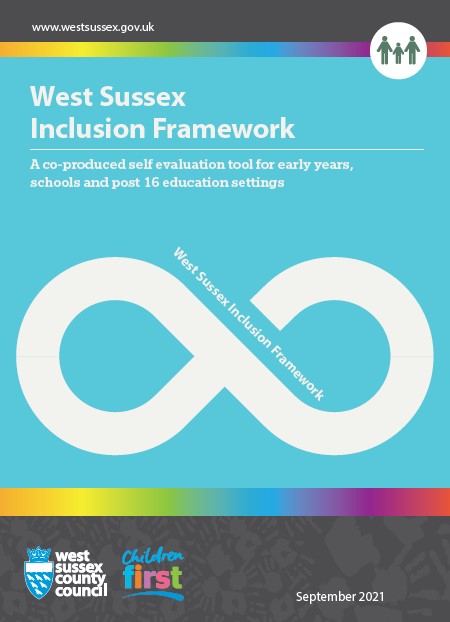
West Sussex Inclusion Framework September 2021 doc
Is there evidence that…
- There is an open and supportive atmosphere that promotes self-awareness and allows children and young people (CYP) and staff to reflect on their own emotional needs and triggers.
- Staff and CYP well-being are promoted and supported allowing them to flourish.
- CYP are given opportunities to share their feelings and emotions and these are acted upon by the adults within school.
- The school curriculum is reflective of CYP needs and provides a universal curriculum for all CYP to develop all areas of social and emotional well-being and self-awareness.
Discussion prompts / evidence of impact
- The school has a social and emotional wellbeing policy in place that impacts positively across the school. This policy includes supporting the wellbeing of staff and consideration of their workload.
- Staff at all levels understand CYP’s behaviour in context, in terms of communicating or attempting to address unmet needs. Staff understand their role in co-regulating and developing CYP’s capacity to become independent, regulate their emotions and manage their behaviours effectively.
- Staff audit the learning environment on a regular basis, ideally with parents and CYP, to explore how it meets the needs. The planning of the environment takes account of the triggers for CYP. Adjustments are made to the interior and exterior environment to make it accessible e.g. sensory garden/ low arousal spaces. Staff try to see the world through the CYP’s eyes and really listen to their experience, even though they may not truly understand exactly how this feels.
- The setting has activities that are well organised, structured and planned for. Where possible, advanced warning is given, to both CYP and parent, of any changes to familiar routines in a meaningful and helpful way, particularly to those with neuro diverse needs.
- Strategies to support CYP’s social and emotional needs, including those derived from a therapeutic thinking approach, are embedded within the classroom and used consistently across the school. CYP see these tools and structures as useful and purposeful tools. CYP’s needs are met such that they can remain in the classroom and learn effectively.
- Staff do not assume CYP understand the language of emotions so use scaffolds to support their understanding and use language that supports co-regulation.
- Staff understand the link between emotional regulation and readiness to learn and refer to the special educational needs co-ordinator (SENCO) when concerns arise.
- Staff are aware of the risk factors for CYP in response to life events and at times of crisis that might contribute to social, emotional and mental health difficulties, e.g. trauma, Adverse Childhood Experiences, sensory dysregulation and attachment issues.
- A range of holistic assessment tools are used effectively to support CYP. These highlight strengths, progress and areas for development and action plans outline activities and ideas to develop skills. See SEND Toolkit for examples.
- Social and emotional health and well-being of all CYP is monitored, and interventions are put into place to support CYP to develop their social and emotional needs. Outcomes are shared with parents.
- A whole school approach to Education for Safeguarding (such as WSCC E4S) is clearly evident and facilitation of learning is effective in meeting the needs of the school community.
- The school works with parents to support the child’s emotional well-being, this is reflected within the school’s Relationship and Health or Relationship, Sex and Health Education (RSHE) and wider Education for Safeguarding curriculum (please refer to WSCC E4S) in line with statutory guidance.
Last updated 16 August 2021
 Tools for Schools
Tools for Schools